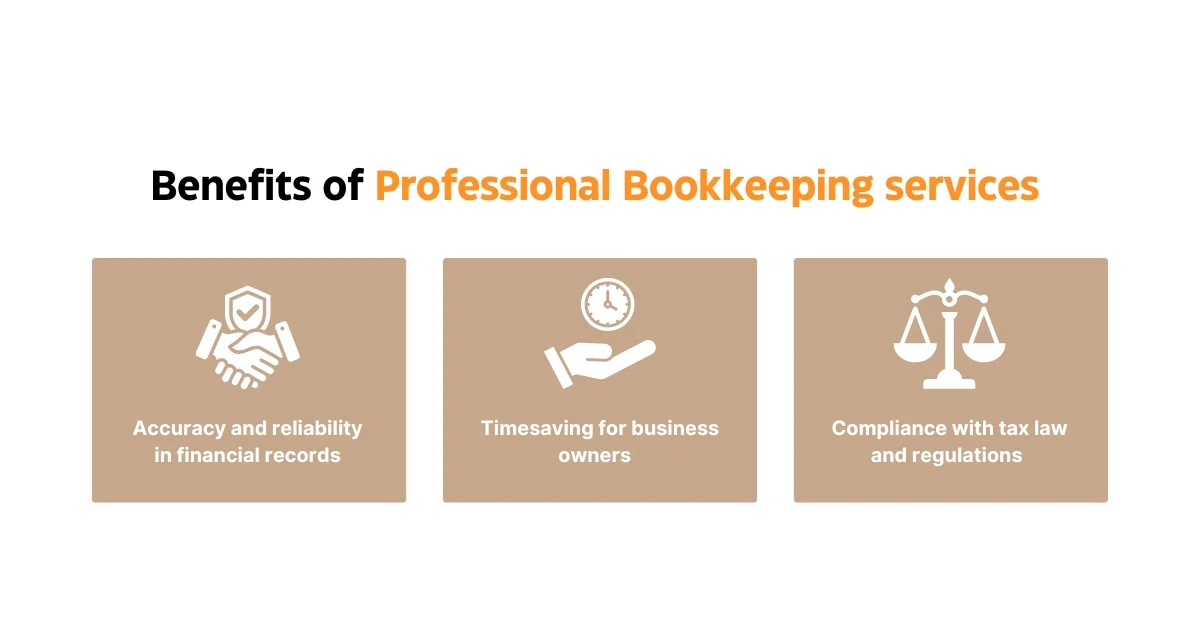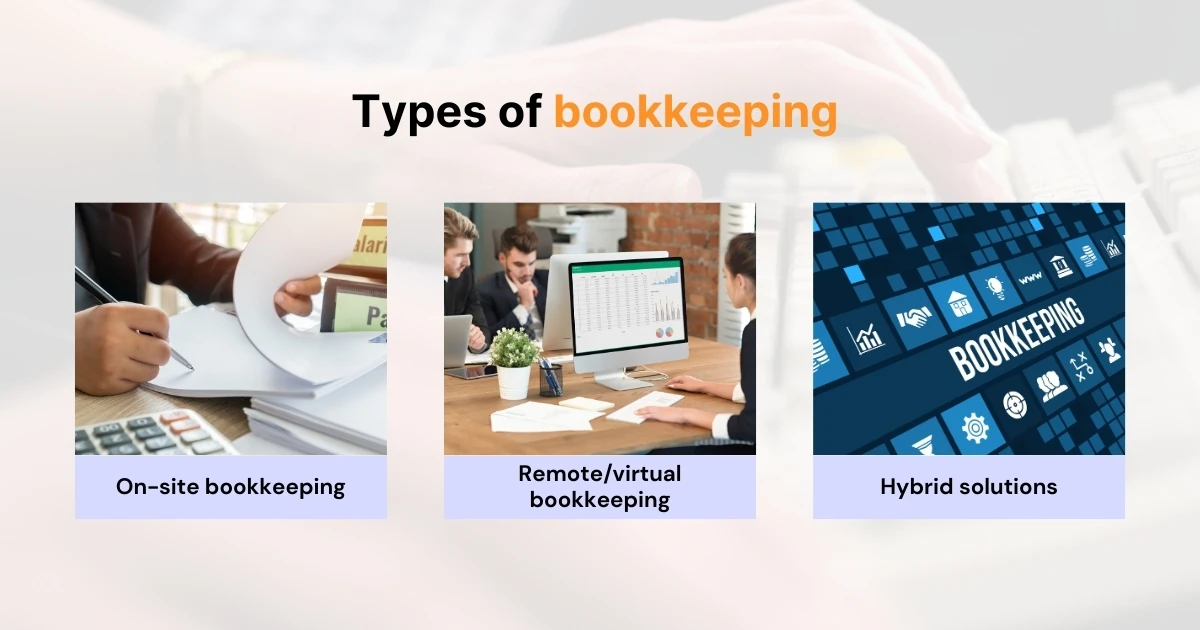
“Bookkeeping is the thread that weaves the fabric of a successful business,” states Angie Mohr, author of Money$marts and Piggy Banks to Paycheck.
This quote very succinctly explains how bookkeepers contribute to laying the foundation for success for small and medium enterprises (SMEs).
By not settling bookkeeping for your business, you are taking a grave risk of failure. SMEs require bookkeeping services for the maintenance of correct financial documents. Client bookkeeping solutions help SMEs take care of their financial records efficiently. The solutions help streamline recording, organising, and analysing financial trades precisely and with adherence to regulatory requirements. Now, SMEs can prioritise transparency and accountability in financial management for business success.
Bookkeeping is systematically recording and organising an enterprise’s transactions daily. Bookkeeping services manage a business’s financial affairs while laying the groundwork for accurate accounting. Accurate bookkeeping is fundamental to the success of an enterprise. Enterprises could grow and profit once they have recorded all transactions in an organised manner and are ready to comply with many laws.
Bookkeeping keeps the enterprise’s finances up-to-date and running smoothly.
By following this procedure, all the financial records are documented so that every economic event can be easily monitored and scrutinised in the years to come.
Key features that should be highlighted include sales and revenue tracking, which keep track of all the sales transactions and income revenue generated by the business. It looks at the trend in the inflow of income and the pattern that formed over time. Expense recording makes sure that information about managing budgets and costs is kept.
Good accounts payable and receivable management build financial strength and support business operations. Proper invoices to clients make sure that clients will pay their bills on time, and a fair record of each invoice is kept. Keeping payments and outstanding invoices regulates cash flow and detected overdue accounts. Follow-up of clients in case of overdue payments is crucial to retain good economic relationships from time to time.
This process involves the verification of two sets of records for accuracy and consistency. Bank reconciliation is the detective process of comparing the SME’s cash balance to the cash records furnished by the bank to find discrepancies. Credit card reconciliation is the process of checking credit card statements against the enterprise’s ledger to see that all transactions are properly posted. Proper execution will ensure accuracy in bookkeeping and allow verification in fraudulent situations that may occur.
This bookkeeping process is crucial, as it improves employee management and maintains compliance with regulations. Enterprises will face disgruntled employees and government penalties when they do not manage this process properly.
Payroll deductions are amounts deducted from employees for designated expenses. Employee salary processing balances legal compliance with managing employee trust through consistent payment distribution and accounting for deductions. Tax withholdings are annually deducted from employees’ salaries for income taxes and government programs. Pre-tax deductions are also applied to retirement plans and health insurance premiums.

Accurate financial records give insight and clarity into profits, cash flow and financial performance of the enterprise. This insight is vital for making strategic decisions, deciding how to improve and plan.
As an enterprise, accurate financial records serve as the strong bedrock that enterprises can use to monitor financial transactions, evaluate their performance, and follow regulatory guidelines. These accurate records facilitate a reliable understanding of the enterprise’s performance and health.
You can save time focusing on important tasks in your business by prioritising bookkeeping. Bookkeeping is time-consuming. Outsourcing will lead to better use of time, resources, and productivity.
It is extremely important to follow the rules for financial reporting. Tax laws are complex, and their rules and deadlines keep changing. When you try to work on your own, you can jeopardise your business. Bookkeepers know tax laws well. Outsourcing your bookkeeping will safeguard your finances and business.
Client bookkeeping solutions use technology to simplify tasks, better accuracy, and grow the connection between businesses and bookkeeping professionals. A business-centric approach is essential to deliver value beyond mere transactional communication. Understanding and anticipating a business’s needs is crucial to bookkeeping. You need to build a long-term relationship with existing businesses through positive word of mouth.
Bookkeeping needs personalisation according to the business needs. Insights need to be industry-specific to help the business owner feel that your bookkeeping solution is relevant to them. Personalisation helps build a stronger, trusting relationship.
Bookkeeping solutions can seamlessly function with existing business processes to provide best results. It eliminates need for manual work, reducing the risk of mistakes and increases efficiency. Integration streamlines financial management to ensure smooth data flow between systems, informed decision-making and effective business growth.

Bookkeeping solutions work to help enterprises manage their financials effectively. There are three types of client bookkeeping solutions according to preferences:
On-site bookkeeping – is a traditional process where the bookkeeper is physically present at the business’s location to oversee, manage all daily transactions and record-keeping efforts.
Remote/virtual bookkeeping – uses technology solutions to manage business’s records from a remote location. Often, it uses cloud-based software for real-time updating of financial data.
Hybrid solutions – use a combination of on-site and remote bookkeeping. This solution works on flexibility. This balance provides customisation according to the business’s changing needs.
Effective bookkeeping services are fundamental to the success of your enterprise. As enterprises grow, there are various technological advancements that bookkeeping service providers (BSPs) use to become indispensable for business growth. At this juncture with the availability of seemingly endless solutions, it is vital that as a small and medium business owner, you choose the right bookkeeping service for your business.
Before choosing the correct bookkeeping service, it is important to assess your specific needs. You need to know the size of your business, the complex demands of your financial needs, and the industry-specific regulations you need to follow. Assessing this process correctly will help you determine the level and kind of bookkeeping service you need.
We have understood that bookkeeping is extremely crucial for SMEs particularly in your specific industry. As you look to establish your business, having experienced bookkeepers manage your bookkeeping needs for your business is a real win.
Experienced bookkeepers know your business and your personalised needs. It is important to review the bookkeeping service’s certifications, industry expertise, years of experience, and client testimonials that can prove the record of good bookkeeping services.
Understanding the cost dynamics is essential to making strategic decisions based on your budget and needs. You need to understand pricing models that suit your needs. It is important to evaluate the quality of service against the value you receive for your business.
You need to establish a clear budget based on your business’s financial capacity. With a well-established budget, you can find stability and prevent overspending.
Implementing bookkeeping solutions for your business is important for businesses. You can follow few important steps to integrate bookkeeping solutions into your business.
During initial consultation, a BSP lists out the business’s questions and concerns before beginning the service. It provides information about the business, from the important bookkeeping parts to the most complex issues of tax, accounting and operations. Through this, you learn about their needs and helps you prepare according to it.
You can manage multiple clients by your efficiency. You can gain efficiency through bookkeeping technological solutions and automation tools like cloud-based accounting software to streamline your bookkeeping processes.
You need to:
You can maintain ongoing support and maintenance through expert assistance. This helps to maintain accurate financial records, timely transaction entries, account reconciliation, and receive valuable insights for well-thought decision-making.
Reviewing and updating your bookkeeping needs on a regular basis helps to ensure accuracy, adherence to compliance regulations, and transparency in reporting your finance. This also helps t to prevent fraud, legal issues and incoherence.
Working on financial records, focusing on tax laws, and managing complex transactions are few common bookkeeping challenges. Cash flow management issues are a common struggle in businesses today. You can implement forecasting tools and review your financials regularly to avoid it. Regular regulatory changes are constantly daunting. You can remain updated with continuous education on compliance awareness.
Data entry errors are caused by manual efforts. Using automated BSPs, you can reduce inaccuracies and streamline the process. This is the reason you need to outsource your bookkeeping for SMEs to ensure accurate financial management and regulation adherence.
Effective client bookkeeping solutions are vital for maintaining SMEs success with financial clarity and strategic decisions. Investing in a professional bookkeeping service is a wise choice. You could consider Priority1 Bookkeeping in Brisbane as your reliable bookkeeping partner for personalise bookkeeping services. Prioritise the financial health of your SMEs today.
Stay updated with expert bookkeeping tips and insights! Subscribe now to receive updates directly in your inbox for your business.
* We never spam your email
38B Douglas Street, Milton QLD, 4064 Australia
Monday - Friday 09:30 AM - 05:30 PM
© 2025 All Rights Reserved.